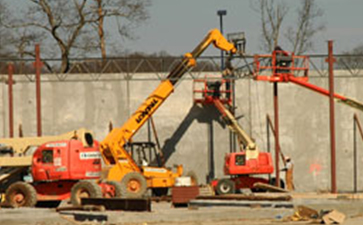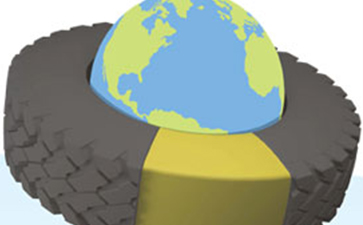How TyrFil Can Help Contractors Better Navigate Uncertain Times
While many within our industry were hopeful that the worst of the supply chain crunch would ease as we glided into 2022, challenges have remained across the tire, transportation, rental management, and construction sectors due to continued limited access to certain raw goods and supplies, at least for the very near future. Nearly every manufacturing vertical in America has been hit by months of ongoing supply chain pressure—with many of the issues residing far beyond U.S. borders as the entire globe grapples with a materials shortage. Everything from paper to semi-conductors have been in short supply—and a non-abundant access to essential materials affecting the tire and polyurethane industries has been no exception.
While industry watchers look to possible easing of the supply chain jam-up come second quarter, there are many variables at play—and all providers within our category continue to be affected by ongoing uncertainty. Here at Carlisle TyrFil, we continue to shore up every available resource—and work closely with our domestic and overseas partners to do everything possible to service our valued customer base and keep ample product in the pipeline for our dealers, distributors, and OEM partners.
The construction industry overall has continued to feel the effects as much as any category—and this is a field tightly dependent on effective on-the-job transportation solutions. According to Anirban Basu, chief economist for Associated Builders and Contractors, “Contractors have the most difficult job in America today because every decision is fraught with risk and uncertainty.” According to Supply Chain Dive magazine, pricing issues are also added to the pain in the marketplace. Contractors “have had an uphill battle dealing with price escalations throughout the course of the pandemic, and many felt squeezed from pre-pandemic contracts that lacked flexibility in regards to materials shortages and price hikes.” Couple this with the fears that many operators have around 2022 insurance rate hikes—and the industry is clearly unsettled at a time when the new White House infrastructure program will ask more of this category than ever before.
The yet additional labor shortage issue is just one more thorn in the side of the industry creating additional layers of insurance headaches. According to NU Property Casualty, “since early 2020, contractors and construction teams have faced skyrocketing material costs and labor shortages, which have unexpectedly exacerbated the cost of doing business and contributed to the compounding nature of the global supply chain crisis. Insurers are facing a difficult time because contractors rely on bonding lines to run their businesses.
It’s clear that multiple facets of industry—from suppliers, to operators, even to the insurance companies—are going to need to work together during this time. And while supply chain woes are something that likely all manufacturers, including Carlisle TyrFil, will continue to combat until we collectively witness a full return to normal operations, there are myriad ways that TyrFil technology can play a proactive role in assisting the construction and rental equipment management market during this time.
Having effective transportation is absolutely vital to a functioning job site—and heavy earthmoving equipment is front and center in terms of the vehicle workhorse “herd.” If any one of these essential machines goes down due to mechanical malfunction or a dreaded tire flat, the whole transportation vehicle “pack” can be rendered useless—as delivery, dirt and supply hauling, and manpower transport trucks are often inter-connected in their operability. No project manager wants any link in this productivity chain to be compromised. While some technical disruptions are inevitable and can’t always be anticipated, the prevention of unwanted tire flats can be virtually eliminated with proper tire technology choices. And good tire selections, in this sense, are directly related to maximizing cost efficiencies on the job, since vehicle disruptions equal lost time and investment for construction companies working under already stressful economic times.
Operators Can’t Control the Global Supply Chain, But They Can Control How They Spend Precious Resources
When construction operators who are reliant on expensive Off-the-Road (OTR) construction vehicles (bulldozers, excavators, skid steers, telehandlers, lift and access machines, forklifts and even large capacity delivery trucks) experience a tire puncture or flat, the immediate work site grinds to a halt. Tires must be replaced, equipment use goes dormant, a vehicle axle may sustain permanent damage, and, in the worst-case scenario, there can be human injuries which can sideline and physically harm the workforce.
TyrFil flatproofing technology can help to ease the pain during already trying times for our industry in these 4 ways:
- Eliminate the headaches of tire flats: Tires injected with liquid polyurethane TyrFil, the leading polyurethane, “foam”, fill manufacturer, are impervious to punctures and flats on the job. Polyurethane-filled tires are able to operate over even the roughest jobsite debris—such as glass, nails, sharp rocks and even rebar—without incident, saving OTR equipment operators time and money.
- Keep productivity flowing: Especially at a time when construction industry prices and raw goods costs are escalating across the board, operators need to know that they’re saving when, and wherever, possible. The last thing they need is an expensive tire flat that can not only grind their worksite to a halt, but that drains their budgets.
- Ensure safety at all times: Especially as insurance considerations will figure in prominently in 2022, and infrastructure undertakings will soar, safety on the job is first and foremost. Tires that utilize “foam fill” are safer for workers, may help to prevent OTR vehicle accidents, and eliminate the unwanted “jarring” for drivers behind-the-wheel that is typical with solid aperture tires. This bumpier, more jolting ride can contribute to an actual medical condition known as “Whole Body Vibration” or WBV that can create muscular/skeletal fatigue and injury, especially for heavy OTR vehicle operators who spend 8 or more hours per day in the driver’s seat.
- More value for the investment: In addition to ensuring that OTR tires won’t go flat in the middle of a busy construction worksite, the use of TyrFil also allows tire carcasses to be repurposed, retreaded and utilized for a potentially longer period of time. During this period of supply chain and raw goods shipment limitations, being able to get more use out of existing materials is paramount for the industry.
An eco-friendly option: As an added value “bonus,” TyrFil is also a more sustainable alternative to solid aperture tires and reduces the amount of tire carcass solid waste going into our already overcluttered landfills. As infrastructure progress looks to increasingly advance parallel environmental protection progress, TyrFil is an attractive technology solution for domestic and global operators seeking a reduction in their carbon footprint.
For more information on ways that the OTR equipment and tire industry can seek cost-effective solutions to counteract the worldwide supply chain slowdown, please visit www.CarlisleTyrFil.com to learn more about the merits of TyrFil flatproofing technology.


